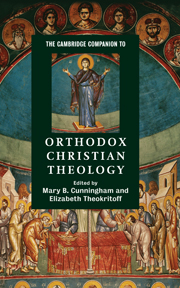Book contents
- Frontmatter
- Who are the Orthodox Christians? A historical introduction
- Part I Doctrine and Tradition
- Part II Contemporary Orthodox Theology: its Formation and Character
- 11 Church Fathers and the shaping of Orthodox theology
- 12 The patristic revival and its protagonists
- 13 The Russian religious revival and its theological legacy
- 14 Some key themes and figures in Greektheological thought
- 15 Personhood and its exponents in twentieth-century Orthodox theology
- 16 The witness of the Church in a pluralistic world: theological renaissance in the Church of Antioch
- 17 Russian theology after totalitarianism
- 18 Orthodox Christianity in the West: the ecumenical challenge
- Glossary
- Bibliography
- Index
- Series list
16 - The witness of the Church in a pluralistic world: theological renaissance in the Church of Antioch
from Part II - Contemporary Orthodox Theology: its Formation and Character
Published online by Cambridge University Press: 28 March 2009
- Frontmatter
- Who are the Orthodox Christians? A historical introduction
- Part I Doctrine and Tradition
- Part II Contemporary Orthodox Theology: its Formation and Character
- 11 Church Fathers and the shaping of Orthodox theology
- 12 The patristic revival and its protagonists
- 13 The Russian religious revival and its theological legacy
- 14 Some key themes and figures in Greektheological thought
- 15 Personhood and its exponents in twentieth-century Orthodox theology
- 16 The witness of the Church in a pluralistic world: theological renaissance in the Church of Antioch
- 17 Russian theology after totalitarianism
- 18 Orthodox Christianity in the West: the ecumenical challenge
- Glossary
- Bibliography
- Index
- Series list
Summary
It is not fortuitous that the followers of Jesus were first called 'Christians' in Antioch (Acts 11:19-26). It was only natural for a city that gathered believers from both Jewish and Gentile backgrounds in one eucharistic community to be linked to the very nature of Christianity. Referring to Antioch, the apostle Paul stresses in Galatians 2 the importance of the universality of the gospel of Christ, its ability to address Jews and Greeks alike, as a sine qua non for the veracity and credibility of his mission.
This 'pluralistic dimension' has always characterised the Orthodox Church of Antioch and shaped its theological discourse. From its first years, Antioch has had a unique experience of multiplicity and diversity; it has always represented a rich human and cultural tapestry, resulting from the encounter of the civilisations of the ancient Near East with Greek and Roman cultures. Later in its history Antioch co-existed with Islam, experiencing both the tolerant openness of the early Islamic rulers and the strict control of the Ottomans. Due to cultural and historical circumstances, the Christians of Antioch did not experience the triumphant dominance of an established Christianity such as we see in both the Byzantine world and medieval Western Europe.
- Type
- Chapter
- Information
- The Cambridge Companion to Orthodox Christian Theology , pp. 246 - 260Publisher: Cambridge University PressPrint publication year: 2008
- 1
- Cited by



